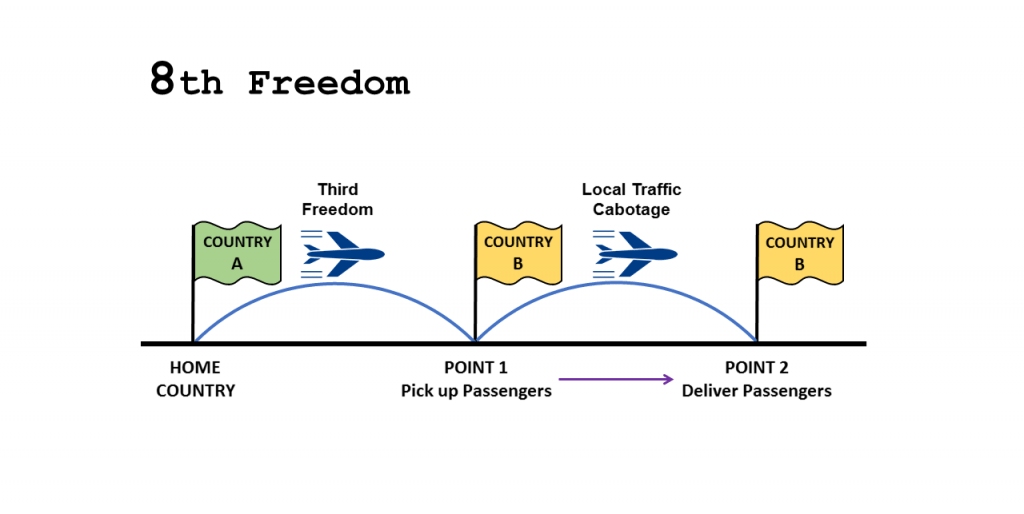In this guide, we’ll explain what cabotage means in private aviation, why it exists, how it differs by country, and how Centurion Jets ensures your flights comply without compromising luxury or convenience.
What is Cabotage in Private Aviation?
In aviation, cabotage refers to a foreign-registered aircraft transporting passengers between two points within another country for hire. In simpler terms, if you’re flying domestically inside a country using an aircraft registered in a different country, cabotage laws may apply.
These rules are part of the Chicago Convention on International Civil Aviation, which grants each country the right to regulate and restrict commercial flights within its borders.
Why Do Cabotage Laws Exist?
Cabotage restrictions are primarily designed to:
- Protect domestic aviation operators from foreign competition.
- Maintain safety and regulatory oversight through national aviation authorities.
- Preserve economic benefits such as local employment and tax revenue.
For private jet travelers, this means that your itinerary could be affected if it includes multiple stops within a foreign country on a foreign-registered aircraft.
Examples of Cabotage in Private Jet Travel
Here are some common situations where cabotage rules might come into play:
- Prohibited Scenario (U.S.): Flying from Miami to New York on a non-U.S. registered aircraft that started its journey abroad.
- Permitted Scenario (EU): Flying from Paris to Rome on a French-registered jet — EU cabotage laws allow intra-member flights.
- Conditional Scenario (Mexico): Flying from Alcapulco to Los Cabos on a U.S.-registered aircraft generally requires special permission.
Aviation Law 101: Freedoms of the Air
The Freedoms of the Air are a set of international aviation rights established under the 1944 Chicago Convention to regulate how airlines and private operators can fly between and within countries. They range from the First Freedom (the right to overfly a foreign country without landing) to more complex rights like the Fifth Freedom (carrying passengers between two foreign countries on a flight originating in the operator’s home country) and the Eighth and Ninth Freedoms (types of cabotage, allowing domestic flights within a foreign country). While the first few freedoms are widely accepted and form the foundation of international air travel, the higher-numbered freedoms—especially those involving domestic operations in another nation—are more restricted, often requiring special bilateral agreements or permits. Understanding these freedoms is critical in private aviation planning, as they directly impact route options, aircraft selection, and compliance with local regulations.

8th Freedom of the Air
The 8th Freedom of the Air, also known as consecutive cabotage, occurs when a foreign-registered aircraft operates a domestic flight within another country as part of an ongoing international journey. In the example above, an aircraft from Country A flies into Country B, then continues on to transport passengers between two points within Country B. Most nations heavily restrict or prohibit this practice unless specific exemptions or permits are granted, as it directly competes with local operators. For private jet travelers, understanding the 8th Freedom is essential when planning multi-stop itineraries in a foreign country to avoid last-minute changes, fines, or denied operations.
Cabotage Rules by Region
- United States: Strict enforcement. Only U.S.-registered aircraft with FAA Part 135 certification may conduct domestic charter flights for hire.
- European Union: More flexible—operators from one EU country can typically conduct domestic flights in another EU country.
- Latin America & Asia: Rules vary significantly. Some nations allow exceptions for continuous international trips; others require permits that can take days or weeks to secure.
How Centurion Jets Navigates Cabotage for Clients
At Centurion Jets, we:
- Review your entire itinerary before confirming an aircraft to ensure no cabotage violations.
- Partner with vetted local operators when domestic legs require in-country registration.
- Secure necessary permits when exemptions are possible.
- Offer seamless multi-operator solutions so the transition between aircraft remains private and efficient.
Our network spans FAA Part 135, EASA AOC, ARGUS, Wyvern Wingman, and IS-BAO certified operators worldwide—ensuring your flight complies with both safety and cabotage requirements.
Why Cabotage Matters for Private Jet Travelers
Ignoring cabotage laws can result in:
- Flight delays or cancellations if authorities deny permits.
- Fines or penalties for the operator.
- Reputational risk for high-profile travelers.
By working with an experienced broker like Centurion Jets, you eliminate these risks and ensure your travel is both legal and luxurious.
Fly Anywhere, Legally and Seamlessly
Whether you’re planning a multi-stop European holiday or a business roadshow across Latin America, cabotage rules don’t have to limit your journey. Our expertise means you enjoy the aircraft you want, the route you need, and complete peace of mind.
📞 Contact Centurion Jets to discuss your next trip, and let us handle the regulations while you enjoy the flight.



